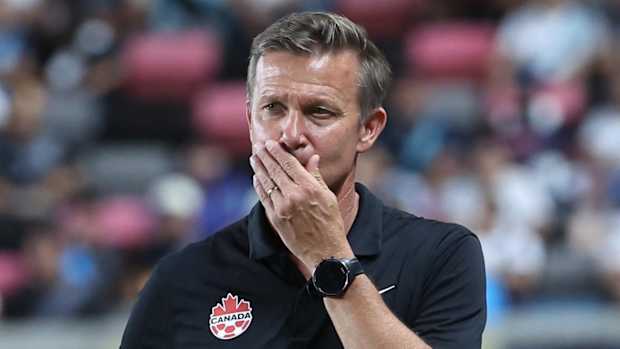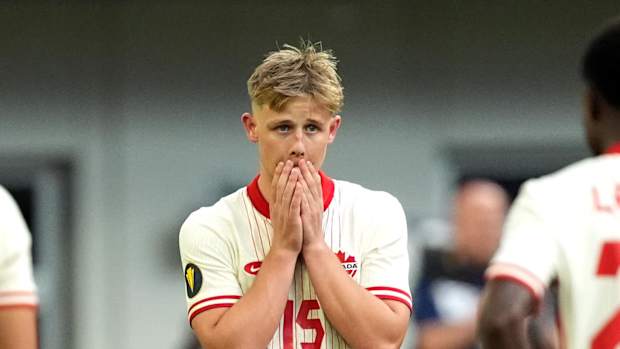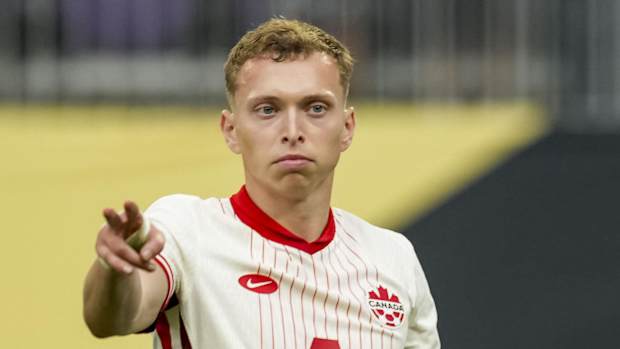Jesse Marsch's Canada Crumbles Under Pressure as Self-Inflicted Wounds Doom Gold Cup Campaign

A precious chance squandered.
The raw emotions were unmistakable as Canada's men's national squad exited the Concacaf Gold Cup quarterfinals against Guatemala - from 19-year-old Luc De Fougerolles concealing his face with his shirt to teammates gazing into the void of disappointment.
Despite being ranked 30th globally, Canada was forced to play a man down for the entire second half following Jacob Shaffelburg's dismissal for a careless second booking, failing to preserve their 1-0 advantage and settling for a 1-1 draw before succumbing in the penalty shootout.
"It's maddening," defender Alistair Johnston expressed moments following the defeat. "Winning tournaments is challenging. You must be clever. You need favorable decisions. Luck must also favor you. Regrettably, we likely diminished our fortune somewhat. It's a painful experience, but also educational."
Ambitious Words Meet Reality

Prior to the Gold Cup, Canada made bold proclamations. Manager Jesse Marsch obtained pledges from elite players, with expectations that the squad could capture their first championship since 2000.
Instead, they collapsed against a Concacaf underdog and won't compete in another meaningful fixture until their FIFA World Cup 2026 home debut on June 11, 2026, in Toronto.
"I sympathize with the squad because I understand their desire," Marsch informed media following the contest. "We must extract lessons from this because I believe we were defeated by our own mistakes, which cannot happen in crucial matches, especially not during next summer's World Cup."
Simultaneously, Marsch acknowledged Canada's absence of several crucial players, including Alphonso Davies, Moïse Bombito and Stephen Eustáquio, plus Ali Ahmed and Jonathan Osorio, who sustained injuries during the tournament.
"To be frank, we're without half our squad... but that's no justification," he stated after the Guatemala match, having previously gained attention for claiming "not one player" declined participation. "I remained confident this was an excellent group, and developing additional players with this team while testing our limits was vital."
'Devastating Blow'—Trophy Dreams End Before 2026

Despite Canada's ascent over the past decade, securing qualification for their second World Cup in 2022 and reaching the 2024 Copa América semifinals, the team still awaits a signature achievement.
Throughout 2023 and 2025, discussions focused on capturing silverware before co-hosting the 2026 World Cup, yet they stumbled to consecutive Gold Cup quarterfinal eliminations without a Concacaf Nations League crown.
Against Guatemala, those aspirations crumbled.
"It's crushing; truly heartbreaking," goalkeeper Dayne St. Clair shared with OneSoccer after failing to save any spot kicks. "We entered this competition with elevated hopes, and this outcome wasn't what we imagined. This pain will linger."
Despite minor achievements like broadening the talent pool and recording positive recent results versus Ukraine, the Ivory Coast, and Honduras, Les Rouges still seek their breakthrough moment.
"This defeat is particularly difficult to accept," Marsch continued. "We must master winning crucial moments. We've progressed significantly during my tenure as national team manager, and I genuinely admire this group and have faith in them, but we must ensure peak performance in the most demanding games and situations. We'll solve this puzzle, and I guarantee: we'll grow from this setback and advance."
Tactical Maturity Must Develop Alongside Squad Depth

One positive aspect of Canada's summer campaign was the emergence of midfielders Niko Sigur and Nathan Saliba, plus center-back De Fougerolles' development.
However, while individual players progressed, Canada's tournament management faltered.
Against Guatemala, both Jonathan David and Tajon Buchanan required substitution due to apparent muscular problems, concluding their tournaments with 299 and 248 minutes respectively of Canada's 360 total Gold Cup playing time.
While depending on star players can lead to success, it left neither available for penalty duties. Though potentially unlucky, the workload on both likely contributed.
Earlier in the competition, Marsch disputed a journalist questioning his "Plan B," emphatically declaring he possessed not only B, but "Plan A, Plan B, Plan C, through double Z."
Against Guatemala, when his team encountered difficulties, they struggled to adjust and lost two key players to penalties while making several questionable substitution choices.
CanMNT's Path Forward

Following the Gold Cup conclusion, Canada must utilize friendlies to refine their World Cup readiness.
The team has already scheduled friendlies against No. 47 Romania and No. 29 Wales in September across Europe, plus a match versus No. 16 Colombia at Sports Illustrated Stadium in New Jersey during October, with additional fixtures to be arranged.
Attention will also remain on players' club performances, particularly Davies's recovery from ACL surgery at Bayern Munich and upcoming transfers for David and Buchanan, likely to be resolved shortly.
However, despite potential benefits from club situations and friendly matches, none will match the intensity of competitive international football, which Canada hoped to experience in the Gold Cup's final four.
"We'll establish internal measures to maintain competitiveness, but friendlies differ from significant matches," Marsch explained. "We must still discover methods to ensure the intensity and comprehension required for elite games exists, reinforcing this every time we unite."
